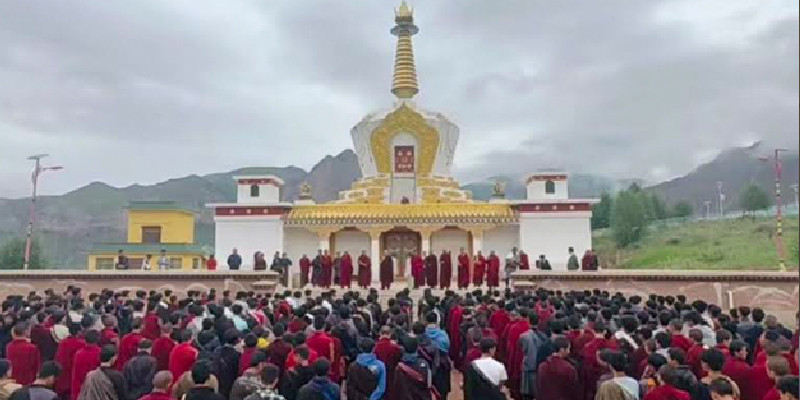Chinese government has forcibly closed Gangjong Sherig Norbu Lobling, also known as Jigme Gyaltsen Nationalities Vocational School. This highly respected Tibetan private institution, located in Golok Tibetan Autonomous Prefecture, had been a beacon of Tibetan education and culture for nearly three decades. The closure, which took place just days after the school’s 27th graduation ceremony, is viewed as a significant escalation in China’s campaign to assimilate Tibetan culture into the dominant Han Chinese identity.
On July 12, the school’s founder and principal, Jigme Gyaltsen, announced the closure following directives from the Chinese government. Within two days, a hurried closing ceremony was held, attended by numerous government officials. The images and videos circulating on social media show heart-wrenching scenes of students and teachers in tears, visibly distressed by the sudden and forced shutdown.
The Chinese authorities have justified the closure by claiming that it aligns with the central government’s vocational school framework and directives from the Qinghai Provincial Party Committee. According to the official narrative, high school students from the now-closed Jigme Gyaltsen school are eligible to enroll in the government-run Golok school, while the faculty and staff are being offered continued employment there. However, many Tibetans see this as yet another step in the systematic erasure of their cultural and educational institutions.
A letter posted by a teacher on the school’s WeChat account expressed the deep sorrow felt by the school community. “Over the past two days, we have received countless calls and messages expressing sadness and concern and seeking answers about the school’s future. The teachers and staff were deeply impacted by the news of the closure and found themselves unable to sleep,” the letter read. “Witnessing their tear-streaked faces and hearing their heart-wrenching cries filled me with unbearable pain. However, we must remember that everything happens due to karma, and unforeseen circumstances are beyond our control.”
Gangjong Sherig Norbu Lobling was founded on December 15, 1994, with the approval of the Machen County and Golok Prefectural governments. The school, which uniquely catered to monastic and lay students from across the three traditional Tibetan provinces—Kham, Amdo, and Utsang—offered a curriculum that blended traditional Tibetan teachings with modern education. Over its 30-year history, the school had educated more than 3,500 students, making it a pillar of Tibetan educational excellence.
Despite facing numerous challenges and pressures from the Chinese government over the years, Jigme Gyaltsen’s dedication and skillful negotiation allowed the school to survive until now. In recent years, however, the crackdown on Tibetan cultural and religious activities has intensified under the leadership of Zhang Xiaojuan, the former party secretary of Golok Prefecture. Local Tibetans believe that the school’s closure is directly linked to Zhang’s hardline stance and the broader Chinese government policy under President Xi Jinping, which seeks to assimilate Tibetan culture into the Han Chinese mainstream.
The closure of Jigme Gyaltsen Nationalities Vocational School follows the shutdown of other Tibetan private schools in the region, including Sengdruk Taktse in 2021 and all Tibetan private schools in Sershul County in 2022. These actions are part of a broader effort by the Chinese government to label the region as “educationally backward” and to force Tibetan students into government-run boarding schools, where they are subjected to intense assimilationist education.
The forced closure of this beloved institution is a devastating loss for the Tibetan community, not just in Golok but across the Tibetan plateau. It marks yet another chapter in the ongoing struggle to preserve Tibetan identity, language, and culture in the face of relentless Chinese government efforts to erase them.







Leave a Reply